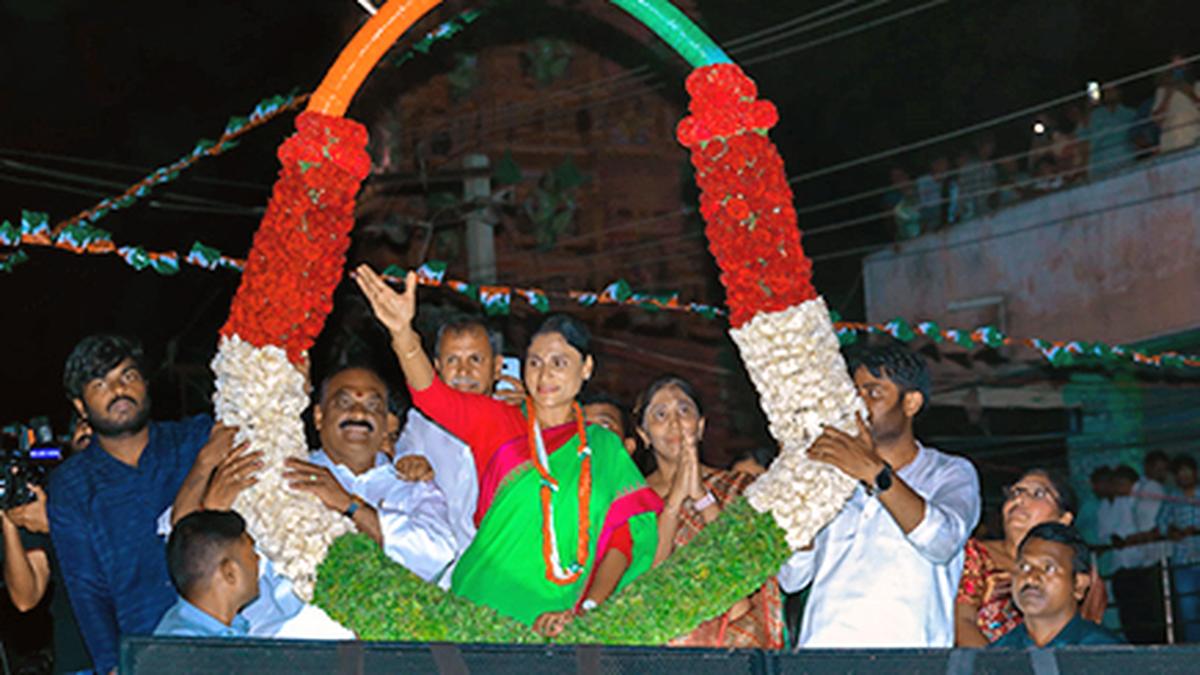No heatwaves alert will stop the political game going on in Maharashtra. A mega public rally for over 2 hours was organised by Maha Vikas Aghadi in the north-western part of Maharashtra, Jalgaon where hundreds of people walked in extreme heat conditions during the day.
Along with NCP (SCP) state president Jayant Patil, Rohini Khadse head of the women’s wing of NCP (SP) was at the Jalgaon District Collector’s office to file nominations for Shriram Patil’s candidature for the Raver Lok Sabha constituency who will contest against her sister-in-law, BJP candidate Raksha Khadse. Shiv Sena (UBT) leader Sanjay Raut was there to file nominations for Jalgaon Lok Sabha Constituency candidature, Karan Pawar.
The Raver constituency has consistently been with the BJP, and Raksha Khadse (sister-in-law of Rohini Khadse) was elected from there with record votes in the 2014 and 2019 Lok Sabha elections.
For Ms. Khadse, this election is all about fighting against a certain ideology (BJP) of a political party who she said is deviating the country from real issues. “We cannot say that the election is about Khadse family versus Khadse family because of our political inclination. Our main fight as a party is against the ideology of the political party sitting in the state of Maharashtra and at the centre. Raksha tai has been working with the Bharatiya Janta Party (BJP) for a long time and I am the head of the women’s wing of NCP (SP) and would remain with the NCP (SP) there is no doubt about that. Our fight is for the issues of our farmers, unemployment and women. As a family we all are doing our part and fulfilling our duty in what we believe in.”
The issue of rural India is very specific, and no communal speech can deviate the public here, said Ms. Khadse. “When you come down to rural India, communal politics does not work. When you look at Jalgaon and Raver or any rural Maharashtra, the population of farmers is more and for them their agriculture matters the most. The farmers are not getting the right rate for their crops like cotton, banana and wheat and that is the reason there is anger among them against the state and central government. They had expected certain provisions that were promised to them by the state and centre, but they were all false promises. Raver taluka is known for banana cultivation. Farmers here needs provisions such as banana wagons and export facilities that can boost the economy of the farmers as well as the local businesses. There is no development here, growth has been stagnant and water crisis is looming because there are no right policies in place by the sitting government in power.”
Despite being each other’s opposition in the political field, Rohini Khadse said that when the family meets, they have a strict policy to keep politics outside the threshold of their home. “When we meet at home, we do not discuss politics and it is a rule in our house to leave politics outside. Moreover, it is very difficult for us to find time to spend with each other, we make the most of it when we meet.”
She recalled her brother, Nikhil Khadse who died by suicide in 2013 at his residence at Muktai Nagar in the district. “Nikhil dada was like the backbone of our family. As a family, we were entirely dependent on him because he was always taking charge of everything and had kept us together in any difficult situation. We feel his absence more every day, specially during election time. His children have also grown up now, and we feel if he were alive, the situation at home, in politics, and elsewhere would have been different.”
Jayant Patil at the rally raised concerns over the rising inflation and overwhelming situation of farmers in the state and country. “Petrol prices have skyrocketed, forget the price of essentials such as milk. Soyabeans and cotton cultivation has gotten worse leaving the farmers overwhelmed as there is no aid in terms of subsidy to practice the local cultivation.”

 1 week ago
117
1 week ago
117




